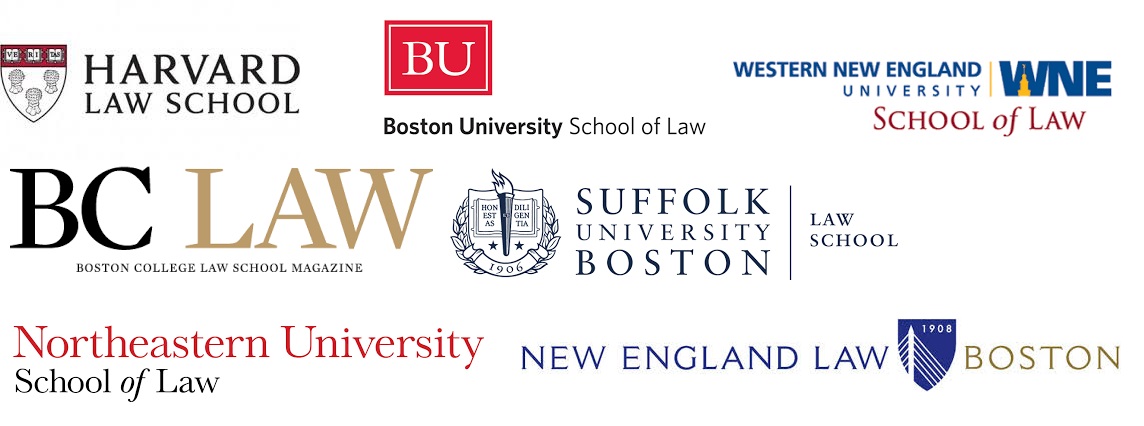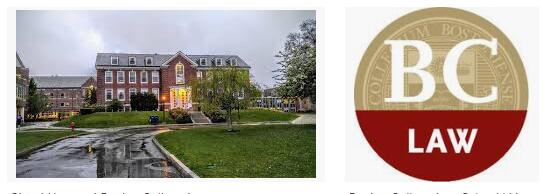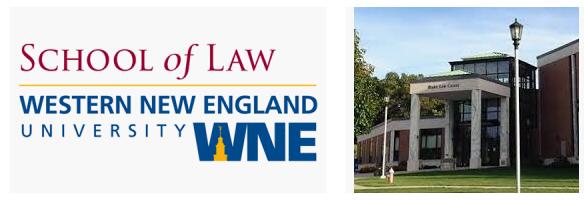Are you pursing a law degree? The TopSchoolsintheUSA.com has generated the latest ranking of best law schools in Massachusetts that provides Master of Legal Studies (MLS), Master of Dispute Resolution (MDR), Juris Doctor (JD), Master of Laws (LLM), or Doctor of Juridical Science (SJD). You can use the following list to pick a school that fits your needs. These law schools in Massachusetts are ranked based on the student reviews, alumni surveys, assessment of peer institutions, and official data reported by each law college. In addition, we also provide average LSAT scores, GPA and acceptance rates for each of these law schools in Massachusetts.

Top ABA-Approved Law Schools in Massachusetts
| National Ranking | Best Law Programs |
| 3 | Harvard University (Cambridge, MA) Acceptance rate: 13.3% LSAT scores (25th-75th percentile): 171-176 GPA (25th-75th percentile): 3.78-3.97 Tuition & Fees: Full-time: $48,786 per year Enrollment (full-time): 1,679 Graduates known to be employed nine months after graduation: 94.6%
|
| 27 | Boston University (Boston, MA) Acceptance rate: 19.7% LSAT scores (25th-75th percentile): 163-167 GPA (25th-75th percentile): 3.5-3.78 Tuition & Fees: Full-time: $42,654 per year Enrollment (full-time): 799 Graduates known to be employed nine months after graduation: 86.8%
|
| 29 | Boston College (Newton, MA) Acceptance rate: 24.0% LSAT scores (25th-75th percentile): 162-166 GPA (25th-75th percentile): 3.5-3.77 Tuition & Fees: Full-time: $41,818 per year Enrollment (full-time): 782 Graduates known to be employed nine months after graduation: 90.6%
|
| 76 | Northeastern University (Boston, MA) Acceptance rate: 36.7% LSAT scores (25th-75th percentile): 154-163 GPA (25th-75th percentile): 3.24-3.64 Tuition & Fees: Full-time: $42,296 per year Enrollment (full-time): 656 Graduates known to be employed nine months after graduation: 87.6%
|
| 138 | Suffolk University (Boston, MA) Acceptance rate: 69.5% LSAT scores (25th-75th percentile): 151-157 GPA (25th-75th percentile): 2.94-3.49 Tuition & Fees: Full-time: $42,660 per year Enrollment (full-time): 1,101 Graduates known to be employed nine months after graduation: 80.5%
|
| 164 | New England School of Law (Boston, MA) Acceptance rate: 71.7% LSAT scores (25th-75th percentile): 149-153 GPA (25th-75th percentile): 2.92-3.39 Tuition & Fees: Full-time: $40,984 per year Enrollment (full-time): 815 Graduates known to be employed nine months after graduation: 71.6%
|
| 191 | Western New England University (Springfield, MA) Acceptance rate: 50.4% LSAT scores (25th-75th percentile): 151-156 GPA (25th-75th percentile): 2.85-3.42 Tuition & Fees: Full-time: $38,240 per year Enrollment (full-time): 320 Graduates known to be employed nine months after graduation: 71.7%
|
All Law Schools in Massachusetts
Massachusetts is home to some of the most prestigious law schools in the United States, offering diverse legal education opportunities for aspiring lawyers. The state boasts a mix of Ivy League institutions, prominent public universities, and private law schools with a focus on both legal theory and practice.
1. Harvard Law School
Overview
Harvard Law School, located in Cambridge, is one of the oldest and most prestigious law schools in the world, founded in 1817. It is renowned for its academic rigor, influential alumni network, and global reach. Harvard Law School consistently ranks among the top law schools worldwide and is known for producing leaders in government, academia, the judiciary, and corporate law. The school offers unparalleled resources, including the largest academic law library in the world, and an extensive array of clinics, research programs, and student organizations.
Degree Programs
Harvard Law School offers a variety of degree programs to accommodate the different goals of its students:
- Juris Doctor (J.D.): A three-year program that provides a comprehensive education in law. Students can pursue specializations in areas like constitutional law, corporate law, environmental law, and international law.
- Master of Laws (LL.M.): A one-year program designed for lawyers from outside the United States or those seeking advanced legal training.
- Doctor of Juridical Science (S.J.D.): The most advanced law degree, intended for students pursuing academic careers in law.
- Joint Degree Programs:
- J.D./M.B.A.: Offered in collaboration with Harvard Business School.
- J.D./M.P.P. (Master of Public Policy): A joint degree with the Harvard Kennedy School.
- J.D./M.P.H. (Master of Public Health): Offered with the Harvard T.H. Chan School of Public Health.
Admission Requirements
Admission to Harvard Law School is extremely competitive. The admissions committee seeks students with outstanding academic records, leadership potential, and a demonstrated commitment to public service or a legal career.
- Average LSAT: 173
- Average GPA: 3.90
Additional application components include:
- Personal Statement: Applicants are required to submit a personal statement explaining their interest in law, career goals, and why Harvard is the right choice for them.
- Letters of Recommendation: Typically, two letters of recommendation are required, preferably from academic professors or employers who can speak to the applicant’s qualifications.
- Resume: Highlighting work experience, leadership roles, internships, and community service.
Starting Salaries
Harvard Law School graduates are among the highest earners in the legal profession. Many pursue careers at top law firms, governmental organizations, and corporations worldwide.
- Median starting salary (private sector): $190,000
- Median starting salary (public sector): $65,000
2. Boston University School of Law
Overview
Boston University School of Law (BU Law) is a highly respected institution located in the heart of Boston. Established in 1872, BU Law has a strong reputation for its commitment to practical legal training and academic excellence. The school is particularly well-known for its programs in intellectual property law, health law, and tax law. BU Law offers students a supportive environment, with small class sizes, diverse clinical opportunities, and access to Boston’s vibrant legal market.
Degree Programs
BU Law offers several degree programs designed to meet the needs of its diverse student body:
- Juris Doctor (J.D.): A three-year program that provides a comprehensive legal education. Students can concentrate in areas such as health law, intellectual property, and litigation.
- Master of Laws (LL.M.): BU Law offers specialized LL.M. programs in Taxation, Banking and Financial Law, American Law (for foreign lawyers), and Intellectual Property Law.
- Doctor of Juridical Science (S.J.D.): A research-focused degree for those interested in academic or policy-making careers.
- Dual Degree Programs:
- J.D./M.B.A.: A joint degree with the Boston University Questrom School of Business.
- J.D./M.P.H. (Master of Public Health): Offered with the Boston University School of Public Health.
- J.D./M.A. in International Relations: For students interested in combining legal studies with global affairs.
Admission Requirements
BU Law seeks students with strong academic credentials, leadership experience, and a commitment to public service or legal practice.
- Average LSAT: 167
- Average GPA: 3.74
Other admission factors include:
- Personal Statement: Applicants must submit a personal statement detailing their interest in law, career goals, and why BU Law is the right fit for them.
- Letters of Recommendation: Typically, two letters are required, preferably from academic mentors or employers.
- Resume: Highlighting professional experience, leadership roles, and extracurricular involvement.
Starting Salaries
BU Law graduates are highly competitive in the legal job market, with many securing positions at top law firms, corporations, and public interest organizations.
- Median starting salary (private sector): $180,000
- Median starting salary (public sector): $60,000
3. Boston College Law School
Overview
Boston College Law School, located in Newton, is a prestigious Jesuit law school that combines academic excellence with a strong focus on ethics, public service, and social justice. Established in 1929, BC Law is known for producing graduates who excel in private practice, public service, and judicial clerkships. The school offers a collaborative learning environment, emphasizing both theory and practical experience through its strong clinical programs.
Degree Programs
BC Law offers several degree programs to cater to a wide array of legal interests:
- Juris Doctor (J.D.): A three-year program that provides students with a broad legal education. BC Law offers concentrations in areas such as criminal law, corporate law, and environmental law.
- Master of Laws (LL.M.): A one-year program for foreign-trained lawyers or U.S. lawyers seeking specialized legal knowledge.
- Dual Degree Programs:
- J.D./M.B.A.: Offered with Boston College’s Carroll School of Management.
- J.D./M.Ed.: A joint degree with the Lynch School of Education and Human Development, focusing on education law.
Admission Requirements
Admission to BC Law is competitive, with the admissions committee looking for applicants with strong academic records, leadership potential, and a commitment to social justice or public service.
- Average LSAT: 164
- Average GPA: 3.60
Other admission components include:
- Personal Statement: Applicants must submit a personal statement explaining their interest in law and how BC Law’s mission aligns with their professional goals.
- Letters of Recommendation: Two letters of recommendation are required, preferably from academic or professional sources.
- Resume: Detailing work experience, leadership roles, internships, and community service.
Starting Salaries
BC Law graduates are well-prepared for careers in both the private and public sectors, particularly in New England and across the United States.
- Median starting salary (private sector): $165,000
- Median starting salary (public sector): $60,000
4. Northeastern University School of Law
Overview
Northeastern University School of Law (NUSL), located in Boston, is known for its unique cooperative legal education program, which integrates academic learning with practical work experience. Established in 1898, NUSL is committed to social justice and public service. Its emphasis on experiential learning allows students to participate in multiple legal co-ops during their studies, gaining hands-on experience in diverse legal fields.
Degree Programs
NUSL offers several degree programs, with a strong emphasis on experiential learning and public service:
- Juris Doctor (J.D.): A three-year program that includes four co-op placements, allowing students to gain real-world legal experience while earning their degree.
- Master of Laws (LL.M.): A one-year program for U.S. or foreign-trained lawyers who want to specialize in areas such as international human rights, health law, or intellectual property.
- Dual Degree Programs:
- J.D./M.B.A.: A joint degree with Northeastern’s D’Amore-McKim School of Business.
- J.D./M.P.H. (Master of Public Health): Offered with the Bouvé College of Health Sciences.
Admission Requirements
NUSL seeks applicants with strong academic backgrounds and a demonstrated commitment to public service or social justice.
- Average LSAT: 161
- Average GPA: 3.50
Other admissions criteria include:
- Personal Statement: Applicants must submit a personal statement discussing their interest in law, career aspirations, and how NUSL’s mission of social justice aligns with their goals.
- Letters of Recommendation: Two letters of recommendation are required, typically from academic professors or employers.
- Resume: Highlighting work experience, leadership roles, and volunteer activities.
Starting Salaries
NUSL graduates often pursue careers in public interest law, government, or corporate law, with many excelling in fields that emphasize social justice.
- Median starting salary (private sector): $115,000
- Median starting salary (public sector): $55,000
5. Suffolk University Law School
Overview
Suffolk University Law School, located in downtown Boston, is known for its strong focus on practical legal training and access to the Boston legal community. Founded in 1906, Suffolk Law emphasizes experiential learning through clinics, externships, and legal practice programs. The school is particularly well-regarded for its programs in trial advocacy, legal writing, and intellectual property law. Suffolk Law offers both full-time and part-time evening programs, making it a flexible option for working professionals.
Degree Programs
Suffolk Law offers several degree programs aimed at preparing students for a wide range of legal careers:
- Juris Doctor (J.D.): A three-year full-time program or a four-year part-time evening program. Suffolk Law offers concentrations in trial advocacy, intellectual property, and health law.
- Master of Laws (LL.M.): A specialized one-year program for U.S. and foreign-trained attorneys, with specializations in global law and technology, international law, and intellectual property.
- Dual Degree Programs:
- J.D./M.B.A.: A joint degree with Suffolk’s Sawyer Business School.
Admission Requirements
Suffolk Law seeks applicants with solid academic credentials and a commitment to developing practical legal skills.
- Average LSAT: 153
- Average GPA: 3.23
Additional admissions components include:
- Personal Statement: Applicants must submit a personal statement outlining their reasons for pursuing law and their career goals.
- Letters of Recommendation: Two letters of recommendation are required, preferably from academic or professional sources.
- Resume: Highlighting leadership experience, work history, and extracurricular involvement.
Starting Salaries
Suffolk Law graduates often pursue careers in private practice, government, and public service, particularly in Massachusetts and the New England region.
- Median starting salary (private sector): $85,000
- Median starting salary (public sector): $60,000
Experiential Learning Opportunities in Massachusetts Law Schools
All of Massachusetts’ law schools emphasize experiential learning, providing students with real-world legal experience through clinics, externships, and internships.
Harvard Law School
- Legal Services Center: Students represent clients in areas such as family law, housing law, and consumer protection.
- Harvard Immigration and Refugee Clinic: Provides students with opportunities to work on asylum and immigration cases.
Boston University School of Law
- Civil Litigation Clinic: Students represent low-income clients in family law, housing disputes, and consumer protection cases.
- Startup Law Clinic: Provides legal services to startups and entrepreneurs in Boston’s vibrant tech scene.
Boston College Law School
- Innocence Program: Students work on cases of wrongful convictions, seeking exonerations for those who have been wrongly imprisoned.
- Environmental Law Clinic: Focuses on environmental litigation, policy, and advocacy.
Northeastern University School of Law
- Co-op Program: Students complete four full-time legal co-ops, gaining hands-on experience in various areas of law.
- Domestic Violence Institute: Students provide legal assistance to survivors of domestic violence.
Suffolk University Law School
- Housing Discrimination Testing Program: Students work to uncover and address housing discrimination in Boston.
- Juvenile Defenders Clinic: Focuses on representing minors in criminal and family law matters.
Bar Passage Rates
Bar passage rates reflect how well law schools prepare students for the bar exam:
- Harvard Law School: 95% bar passage rate.
- Boston University School of Law: 90% bar passage rate.
- Boston College Law School: 88% bar passage rate.
- Northeastern University School of Law: 80% bar passage rate.
- Suffolk University Law School: 78% bar passage rate.







